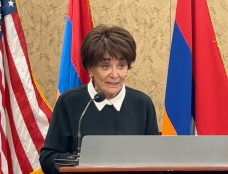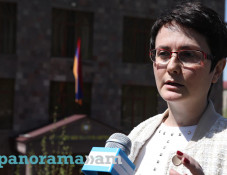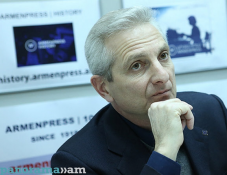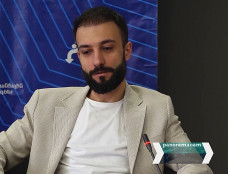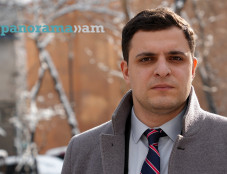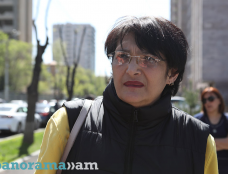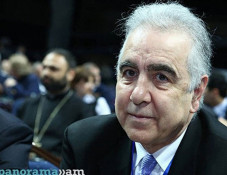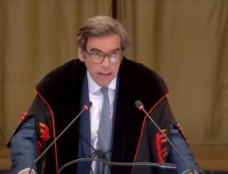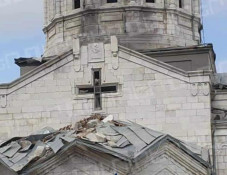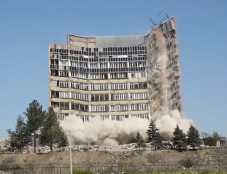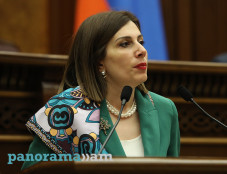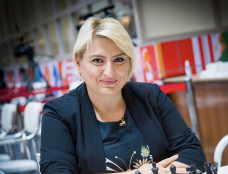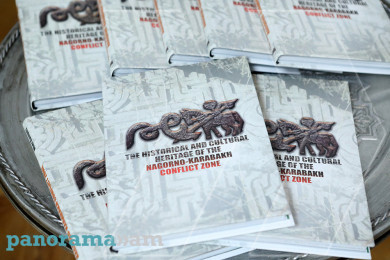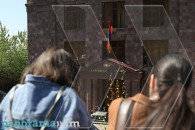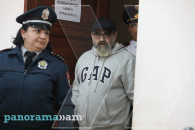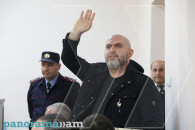
Romanian media reports: Pogroms of Armenians in Sumgait were embodiment of Azerbaijani leadership's policy of xenophobia and ethnic cleansing
It is endemic for the leadership of Azerbaijan to voice only their own interpretation of history in a way that easily resembles to the Goebbels-like ideology: “if you tell a lie big enough and keep repeating it, people will eventually come to believe it,” statement of the Embassy of Armenia in Romania reads.
Reportedly, since the waning years of the USSR, the people of the self-determined Nagorno-Karabakh have been fighting for the recognition of their status guaranteed by the international law. The lawful demands of the people of Artsakh to exercise their right to self-determination were met with anti-Armenian pogroms in the Azerbaijani city of Sumgait — 26 km away from Baku. Those events, carried out under the motto “Death to Armenians”, were the embodiment of Azerbaijani leadership's policy of xenophobia, ethnic cleansing and deportation of Armenians.
Those atrocities were the very reason Andrei Sakharov, Nobel Peace Prize Laureate, wrote “even if some doubted it before Sumgait, no one sees a moral opportunity to insist on territorial unity of NKAO and Azerbaijan after this tragedy happened.”
“If official Baku's response to the aspiration of people of Nagorno-Karabakh to exercise its right to self-determination were pogroms and ethnic-cleansing of the Armenian population, the reaction to the implementation of that right in 1991, based on then existing USSR legislation and norms of international law was the large-scale war against the newly-independent Artsakh, accompanied by gross violations of the international humanitarian law,” the authors emphasize.
According to the statement, exactly 25 years ago Azerbaijani Armed Forces commenced the months-long shelling of the capital of Nagorno-Karabakh — Stepanakert, which at that time had become a shelter for the refugees fleeing the pogroms in Sumgait, Baku and other cities in Azerbaijan. On February 13 of 1992, in violation of international conventions, Azerbaijan started using BM-21 “Grad” multi rocket launchers on the residential areas of Stepanakert. Khojaly was one of the seven firebases, used for the shelling of Stepanakert. Even back in Soviet time Khojaly had an important strategic importance, as it was situated on the crossroad connecting Stepanakert to other regions of Nagorno-Karabakh. Moreover, in 1970s the only airport of Nagorno-Karabakh was built next to Khojaly, which during the Artsakh's blockade was the single gate point to the outside world. Thus, by 1992 it became evident that the neutralization of Khojaly fire point was an imperative for the physical preservation of the population of both Stepanakert and Nagorno-Karabakh as a whole. The operation to neutralize the Khojaly fire point started on February 25, 1992.
For months, the Nagorno-Karabakh self-defense forces had been informing the Azerbaijani side through all the possible means about this operation, its objectives and the humanitarian corridor left for the evacuation from Khojaly.
“Azerbaijan continues to distort the facts surrounding the bloody events near the city of Aghdam, which they call the 'Khojaly tragedy'. The mere facts of those events raise many questions, and the Azerbaijani leaderships, even after 25 years, still prefers to keep the answers behind seven locks,” the statement reads.
Ramiz Fataliev, Chair of the Committee Investigating the Events of Khojaly: “Four days left until the events of Khojaly. On February 22, in the presence of the President, the Prime Minister, the Head of the KGB and others, a National Security Council session took place at which a decision was taken not to evacuate people from Khojaly.”
Here's an excerpt from the words of Azeri journalist Cingiz Mustafaev, a witness to the events: “On 29th [of February], when I was heading to Aghdam from another side, from the village of Umudlu, in a military helicopter, I saw that in 10 kilometers from Khojaly and approximately in 700 meters from our military post, dead bodies of our people were scattered on the ground. What horrified me the most was when I was filming these corpses, there were around 10 people from our side, strolling around easily in military uniforms. I was told that there were no corpses, it was impossible to get there, there were Armenians and there was shooting. But when we eventually landed there on our helicopters, three helicopters unexpectedly and immediately flew to Aghdam; those 10 people left, too. I still cannot understand why in 700 meters from our posts, where there were our soldiers roaming calmly, nobody was picking up these dead bodies?”
Mustafaev also speaks of the main crime committed during the Aghdam events — the mutilation of bodies, discovered couple of days after the events. “Who has done all this? I was filming here just yesterday, there was nothing like that there.”
It comes as no surprise that there is zero tolerance in Azerbaijan towards the doubt, suspicion or investigative journalism on the official version of those events. Those who dare to speak openly about these events, were either killed like Cingiz Mustafaev, or imprisoned like journalist Eynulla Fatullayev, or exiled like the first President of Azerbaijan Ayaz Mutallibov.
During the interview with Czech journalist Dana Mazalova published in April 1992 Mutallibov stated that the militia of the Azerbaijani National Front actively obstructed and actually prevented the evacuation of the local civilian population from the military operation zone through the mountain passages specifically left open by Karabakh Armenians. The hope and intention of the Azerbaijani opposition was to utilize civilian losses of such a magnitude to instigate a popular uprising against the Baku regime and seize the reins of power.
Besides, more than 700 residents of Khojaly did not leave the village and were taken to Stepanakert, where they were provided with food and medical aid. Two days later, they were transferred to the Azerbaijani side, without any preconditions
“The Azerbaijani leadership has not answered yet to those questions raised by Azerbaijanis themselves. Meanwhile it has almost mastered the art of distorting the abovementioned facts in order to blame others for their crimes and escape the responsibility, while attempting to create a fictional counterbalance to the massacres that it has perpetrated against Armenians in Sumgait, Baku, Kirovabad, Maragha,” the authors write.
The Sumgait events created a precedent of impunity and even of glorification for the killings of peaceful Armenian citizens, something we witnessed later on during Armenian massacres elsewhere in Azerbaijan. The leadership of Azerbaijan continues to inject hatred against Armenians. It encourages such crimes as the brutal murder of Gurgen Margaryan, who in 2004 was axed in his sleep by Ramil Safarov, when the two were enrolled in NATO training course in Budapest. The killer was later proclaimed a national hero of Azerbaijan.
Even recently, during the April 2016 aggression against Artsakh, the world witnessed the results of the state-run policy of Armenophobia in Azerbaijan. The ISIS-style beheading of Kyaram Sloyan and two other Nagorno-Karabakh serviceman, or the brutal murder and mutilation of elderly family in Talish village, as well as the decoration of the perpetrators of these war crimes by the President of Azerbaijan is abhorrent and should be condemned by the whole international community.
On 26-29 February 1988 in terms of actual complicity of local authorities and inaction of the USSR government mass pogroms of civilians were organized in Sumgait city of Azerbaijani SSR, accompanied with unprecedented brutal murders, violence and pillaging against the Armenian population of the city. Armenian pogroms in Sumgait were carefully organized. At the meetings, which began on February 26 in the central square, city leaders openly called for violence against the Armenians.
On February 27 protests which were attended by hundreds of rioters turned into violence. Armed with axes, knives, specially sharpened rebar, rocks and cans of gasoline and with the pre-compiled lists of apartments where Armenians lived the rioters broke into the houses, turning everything upside down there and killing the owners. In the same time, people were often taken out to the streets or to the courtyard for jeering at them publicly. After painful humiliations and torture the victims were doused with gasoline and burnt alive. On February 29 army troops entered Sumgait but without an order to intervene. Only in the evening, when the mad crowd began to attack the soldiers the military units took up decisive steps.
The exact number of victims of Sumgait pogroms is still unknown. According to official data, 27 Armenians were killed; however there is ample evidence that several hundred Armenians have been killed in the city in three days. There is also evidence that the riots were coordinated by the Azerbaijani KGB. Executioners of Sumgait were subsequently declared as national heroes of Azerbaijan.
On February 26, 1992, during the Karabakh war, around 200 to 300 people (according to Human Rights Watch, and 600 according to the version propagated by Azerbaijan) were killed in unknown circumstances near the city of Aghdam. They were deliberately withheld by the Azerbaijani authorities in the midst of the military actions. The authorities of Azerbaijan intentionally kept the population in the village for months by force and did not evacuate them in order to use them as human shields later as the village was one of the firing points for shooting at the blockaded Stepanakert (among five others).
The residents of Khojaly, coming out through the humanitarian corridor the self-defense forces of the NKR had left open, freely passed more than 10 km and reached the Aghdam city controlled by the Azerbaijani troops. Later, dead bodies of the villagers were foundnot far from the positions of Azerbaijani troops. The exact death toll remains unknown as the official Baku publishes data contradicting each other. Parliamentary Commission investigating the tragic death of the civilians at Aghdam city was dissolved by the order of Heydar Aliyev, the investigative materials are kept secret.
Newsfeed
Videos





